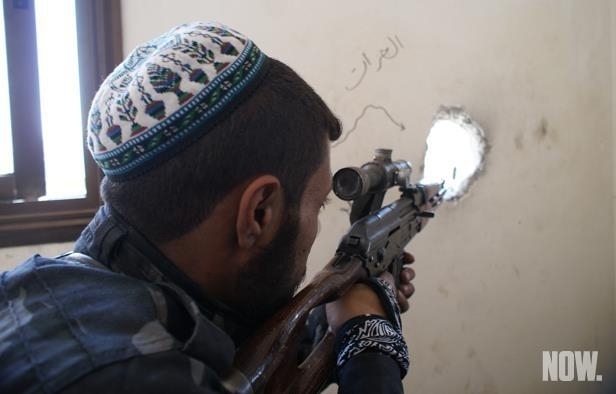The sentence was carried out on a cloudy morning, as he knelt surrounded by an army of black flags bearing the slogan “There is no god but God.” He looked weary, dreary-eyed. His bearded face was plainly displayed on satellite TV and the internet, surrounded by masked fighters whose features could not be seen as they enacted "God’s law on earth."
This was the final chapter of Hassan Jazra’s life, a story that is on the tip of every tongue in Aleppo’s rebel-held neighborhoods. One cannot adopt a clear stance on the man: he was known as both a hero and a thief. Jazra, who was executed by the Islamic State of Iraq and al-Sham (ISIS), mirrored the Syrian uprising with its ups and downs and all its turbulent mood swings. He embodied the image of a commando hero, a corrupt man fought and liked by all, a fierce fighter and a popular legend who was the object of various interpretations.
Born in Sakhour to the Kayyara clan, Jazra was transformed by the uprising from a smuggler and watermelon merchant into a folk hero and popular leader. He took part in the peaceful protests and then in the armed struggle, epitomizing the profound crisis that characterizes the Syrian conflict. The peaceful protest movement mobilized people from poor areas shoulder-to-shoulder with many educated citizens. Herein lay its beauty – the uprising broke the prevalent alienation between social classes. But all this soon faded as the regime began exercising increasingly brutal tactics. Educated people fell from the ranks of the revolt through arrest, displacement, or opting for silence, leaving it to poor people to carry weapons and subsequently lead the uprising.
Aleppo knew Hassan Jazra as a thief. Yet he did not leave his post at the front for a year and a half in the face of regular army attacks. He was a son of the protest movement who was driven by deteriorating circumstances to become a military leader of a type that became increasingly typical over the course of the war.
Hajji Mareh was killed a few days ago in a targeted assassination. Like Jazra, he had emerged as an example for other people and was known to be the most popular commander. Yet he was almost crippled within the Tawhid Brigade, as he was merely a military commander with no political decision-making. Next to him in popularity was Hassan Jazra, who did not benefit from the support of any Arab or Western state. The only solution left for Jazra – admittedly an unethical one – was to steal. The Tawhid Brigade is known to be seeking the creation of an Islamic state, whereas Jazra was not seeking to establish any state or regime. He was more like a pauper, albeit with different ideas and circumstances.
Jazra was not the only one accused of robbery; similar accusations were also often leveled at various military factions. Some accuse ISIS of robbing tractors’ and other factories in Sheikh Najjar. The Tawhid Brigade as well was accused of robbing factories in the industrial zone under the pretext that they belonged to regime forces. In this field of flying accusations, Jazra was merely a small-time thief among giants.
But his popularity still exposed him to many rumors. Pictures circulated of a man who resembled Jazra during Bashar al-Assad’s visit to Daraya, and he was accused of communicating with the regime. Yet the most popular stories about him solicit a healthy dose of admiration and laughter. One tale, for instance, tells of how Jazra wanted to undertake an operation to avenge the Ghouta chemical attack. In the process, he gave all his men drugs and ordered them to shoot everything they had. The Sakhour Front fired all night. When daylight came, Jazra discovered he did not have a single bullet left to repel the army if it chose to attack, and he was forced to beg other brigade commanders to give him ammunition.
Jazra used to explain his motivations as “a personal thing against the Assad family.” These words made him a hero in the eyes of the people, as did his insistence that “if Aleppo does not rebel, we will bring the revolution over to it.” Anyone who met him realized that he was a simple, unaffected, and kindhearted person who seemed to fit the legendary images conjured about him. The latest such legend entailed his release so that he could fight with the 80th Brigade.
Jazra was a Syrian man exposed to dire circumstances. He was spoiled by the regime for 40 years and when he rebelled, the world threw at him problems too complex for him to accommodate. This caused him to fall into predictable ethical problems: he was holding the front with members of his clan, and he needed money – not to get rich, but rather to pay his fighters. The equation was as simple as that and provided, in his opinion, ample justification for his thefts.
The revolution has not known a more problematic figure than Hassan Jazra. For all the criticisms of his robberies and drug addiction, everyone who talked about him spoke with admiration and attested to his eager willingness to help. Though his execution will certainly relieve those who complained of his thieving, for the rest, it will only further promote his popular legend.
......


